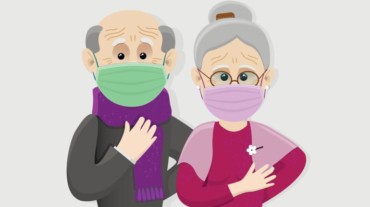
It gives us the chills to even think what will happen if someone in our own family tests positive for covid-19 positive. This thought just blocks our mind’s ability to respond clearly because we know how tricky such a situation can be.
Due to the major spike in coronavirus cases in India, things are even murkier than before. Unavailability of beds, doctors, and attendants are infrastructural issues that can give anyone nightmares.
The good news is that after analyzing the situation, the government has allowed home isolation for the people who are showing very mild symptoms of covid-19. According to the Centers for Disease Control and Prevention (CDC), most of these patients will be able to recover without medical assistance. Having said that, there are cases that have worsened due to a lack of proper assistance and precaution.
There is another major problem which is that there is close proximity to the infected person. Undoubtedly, it can increase the chances of spreading this infection.
According to Dr. Vikrant Shah, intensivist and infectious disease specialist at Zen Multispeciality Hospital, Mumbai, this is one of the main causes of the spike in the cases of coronavirus.
So, how can you plan to minimize the risk of the spread of this novel virus? Well, here’s what Dr. Shah advises:
Here are eight things that you must keep in mind if someone in your family is a covid-19 patient:
“There are no doubts that it depends from case to case but precautions need to be taken otherwise you or someone in your family might get contaminated by this virus. And according to me, this is what you need to do” said Dr. Shah.
1. Isolate the person immediately
“As soon as you get to know that the person is showing symptoms of COVID-19, whether mild or not, the first thing that you need to do is isolate the person there and then”, says Dr. Shah.

But you can stay connected with the patient via technology using video calls and by playing online games so that you can support them emotionally.
Select Topics of your interest and let us customize your feed.
PERSONALISE NOW2. There has to be only one dedicated caregiver
According to Dr. Shah, you need to pick a person who can take care of the patient and has good immunity. “That one person will be the only one attending to the patient. In fact, the caregiver should also stay in isolation from the rest of the family as he/she is in close contact with the patient”, he says.
3. Use disposable utensils for patient
“If you’ll clean the utensils used by your entire family along with the ones used by the patient in the same kitchen then there are higher chances of you getting infected. It is always better to get disposable utensils so that patients can use them and dispose them in a bin”, Dr. Shah suggested.
4. Wear proper gloves to dispose of the items used by the patient
This one is especially for those who are caring for the patient. If you are disposing of anything or touching anything in the room occupied by the patient, you must wear gloves and disinfect them.

5. Don’t share a bathroom with the patient
“Bathrooms are the most vulnerable place in the home and this is where you can catch the COVID-19 infection. Therefore, it is very important to have separate bathrooms for the patient and for the rest of the family”, says Dr. Shah.
6. Keep checking your temperature
Dr. Shah advises, “Everyone in your family should check their temperature and oxygen level two to three times a day.”
7. Be more careful about the elderly
We all know that the elderly and children are the most vulnerable to SARS-CoV-2. Dr. Shah says, “If possible, you should send your parents to your relatives’ place to avoid any contact with the infected person. Moreover, make sure that where your parents are lodging is also a coronavirus-free place, and everyone there has been tested negative for COVID-19.”

8. Disinfect the room and the surrounding area daily
“Just dilute sodium hypochlorite in the proportion of 1:10 (1 part sodium hypochlorite and 10 parts water) and spray it all over the room of the patient and the surrounding area. You can use the same to disinfect in the washrooms as well. Please ensure that you wear proper gloves while spraying the solution as it can give you rashes if it splashes onto you”, he says.
“Apart from that, simple things like staying hydrated, consuming vitamin C in natural forms like lemon and sweet lime, and taking proper sleep is a must for all the family members so that their body can stay strong”, he concluded.
Well, it seems that once someone in your family is detected COVID-19 positive, it takes a lot to ensure that the other members stay away from this infection but it isn’t anything too difficult.
If it strikes you or your loved ones, you know how to tackle it.